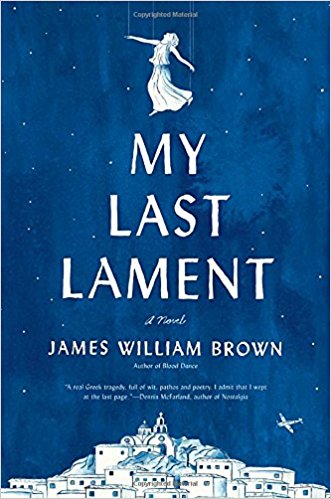 This was an intriguing portrayal of WWII – there are certainly not many books sent in Greece during this time period, so the second I read the blurb I knew that I wanted to read The Last Lament. I was hoping for something along the lines of Anthony Doerr’s All the Light We Cannot See – a book set in WWII that isn’t about the holocaust so much as the lives of people in occupied countries and their day to day trials. Don’t get me wrong – books on the holocaust are so important, but it’s intriguing to get to read about the rest of the war, and the far-reaching effects it had all across Europe. The horrors of the holocaust often occupy the majority of our headspace (and our historical fiction), so it’s rare that an amazing book comes along that looks at other parts of this global conflict and shines a light where before there was only darkness.
This was an intriguing portrayal of WWII – there are certainly not many books sent in Greece during this time period, so the second I read the blurb I knew that I wanted to read The Last Lament. I was hoping for something along the lines of Anthony Doerr’s All the Light We Cannot See – a book set in WWII that isn’t about the holocaust so much as the lives of people in occupied countries and their day to day trials. Don’t get me wrong – books on the holocaust are so important, but it’s intriguing to get to read about the rest of the war, and the far-reaching effects it had all across Europe. The horrors of the holocaust often occupy the majority of our headspace (and our historical fiction), so it’s rare that an amazing book comes along that looks at other parts of this global conflict and shines a light where before there was only darkness.
And in many ways, The Last Lament lived up to my expectations. It’s beautifully written, though a bit slow at times, and the perspective is certainly unique. It was very interesting to learn more about Lamenters, and I enjoyed the almost magical-realism vibe that Aliki created when speaking about the dead and how she laments for them. The dead were so hyper-present here that I really did feel like the story had otherworldly ties, which sets it apart from other historical fiction. Despite that, it is still very much grounded in reality, and never feels far-fetched.
There are some very painful moments in this book, and even though the prose does feel a bit slow at times I loved how the tension is consistent. You can feel the stress between Aliki, Takis, and Stelios underneath everything all the time, and it kept me intrigued from start to finish. That, coupled with a few secrets that are slowly revealed in the present day, made this book a true mystery (and one that I was eager to solve).
I’d recommend this to anyone looking for a fresh perspective on WWII.
Rating: 4/5 stars
A huge thanks to Berkley Books for sending me a copy in exchange for an honest review.